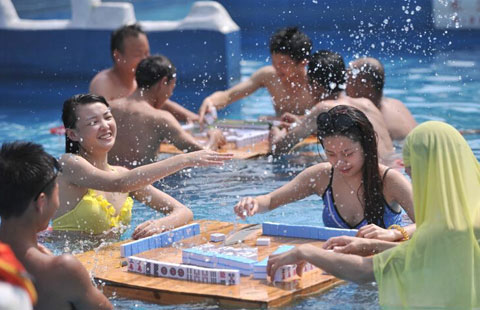Shrinking population the bane of Japan
Updated: 2014-07-25 07:40
By Cai Hong (China Daily)
|
|||||||||||
The national census and surveys in Japan point to a demographic crisis. Japan has one of the highest life expectancies and one of the lowest fertility rates in the world. As a result, children below the age of 15 account for a record low 12.5 percent of the population, the Japanese Internal Affairs and Communications Ministry announced on April 1. The percentage of people aged 65 years and above has also hit a record, albeit on the higher side: 25.6 percent.
The announcement has left Japanese policymakers, both central and provincial, wracking their brains to solve this unprecedented demographic problem. Some of the suggested solutions were indeed bizarre. For example, Tomonaga Osada, member of Shinshiro city assembly in Aichi prefecture, suggested that "punctured condoms" be distributed among married couples to increase the birth rate. Osada has got a stern warning from the assembly, and he also has apologized for his plan to turn the city hall into "a nice and friendly place" for couples.
Another suggestion was to include locally grown yams in the diet because they are believed to be mild aphrodisiacs.
In May came a more shocking announcement, this time from Japan Policy Council, a think tank, that half of Japan's towns and villages would be devoid of women of childbearing age within three decades.
The problem is that, young Japanese are increasingly opting out of marriage, parenthood and even lovemaking. A recent Meiji Yasuda Institute of Life and Wellness survey shows that 40 percent single men in their 20s had never had a romantic relationship with a woman, and more than two-thirds of single women in their 30s were looking for a husband who earned at least 4 million yen (or about $40,000) a year when less than a third of the respondents earned that much.
A growing number of young Japanese men consider themselves "herbivores" - a term coined by Japanese editor and columnist Maki Fukasawa in 2006 for straight men who have no interest in women. In the past 30 years, the number of unmarried Japanese men aged between 30 and 34 has tripled. Many of them choose to be "herbivores" because they don't want to live the life their fathers did - toil day and night to change the lives of their wives (mostly housewives) and children.
More than 60 percent Japanese women leave their jobs after delivering their first child, a rate that has not changed in the past two decades. Many women can't find affordable daycare centers for their children and have no domestic helps to turn to. Moreover, a woman's chance of being promoted reduces drastically if she marries because generally managers don't like women to take maternity leave.
Also, Japan's corporate culture of long working hours, followed by compulsory socializing, makes it difficult for married women to continue working after marriage, especially after becoming mothers. It also leaves Japanese men little time to help their wives with housework and childcare. Research shows that on average Japanese men spend only one hour a day with their children.
In such circumstances, bringing up a child could become an exhausting solo job for mothers. Perhaps that's the reason why 60 percent Japanese women in the so-called peak childbearing age of 25 to 30 have not married.
Japan's National Institute of Population and Social Security Research says that the country's population would shrink to two-thirds from the present 127 million in 50 years and one-third in 100 years. And the land ministry says that the shrinking population will leave more than 60 percent of the country's total landmass uninhabited by 2050.
The current Japanese administration vowed to keep the country's population above 100 million. But for that, as Japan Policy Council has pointed out, every 100 Japanese women have to bear 207 children, up from the current 141, which is easier said than done.
Unless there is a dramatic change in Japan's birth rate or its rigid immigration policy, a fast-shrinking working population will find it difficult to carry the weight of the fast aging population and maintain even a healthy economic growth rate. In fact, if the current trend continues, 40 percent Japanese would be 65 or above by 2060.
Japan has to free its young people of the "celibacy syndrome", for which unfortunately there is no formula. It seems the country has a tough task ahead.
The author is China Daily's Tokyo Bureau Chief. caihong@chinadaily.com.cn
Related Stories
Japan opens Pandora's box 2014-07-02 07:54
Japan nuclear plant gets safety clearance 2014-07-16 16:44
Japan must stop playing with fire 2014-07-22 07:35
Japan challenges China's sovereignty over islands 2014-07-24 21:45
Today's Top News
TransAsia crash while landing in Taiwan
UK fraud office liaising with China on GSK bribery case
Death toll in Gaza mounts to 701
Meat supplier in global crisis
Dogs 'capable' of feeling jealousy
Five detained over stale meat scandal
5 more universities set up human rights centers
Rebels likely downed jet 'by mistake'
Hot Topics
Lunar probe , China growth forecasts, Emission rules get tougher, China seen through 'colored lens', International board,
Editor's Picks

|

|

|

|

|

|





